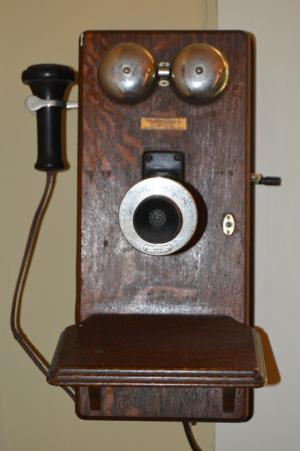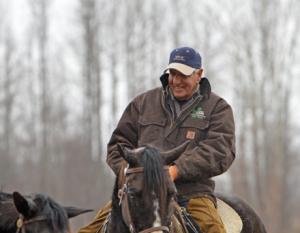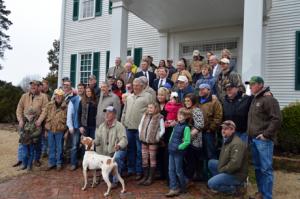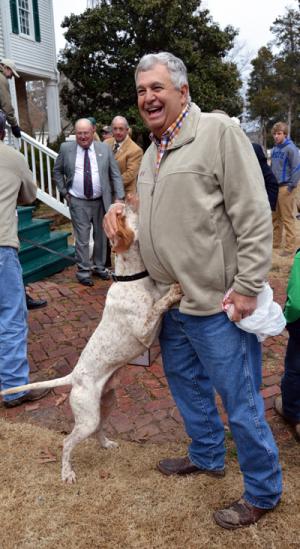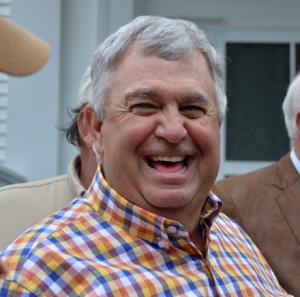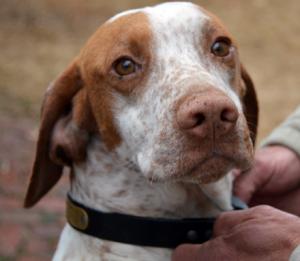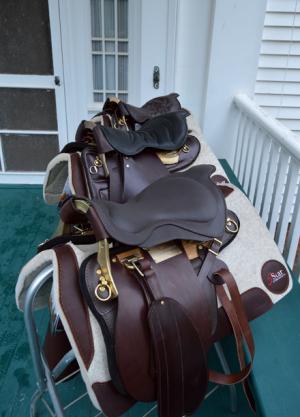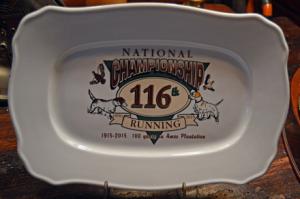By Nancy Brannon, Ph.D.
A light rain started falling around the end of hour two of the afternoon brace on Monday March 2, 2015. Drs. Ron and Davey Deal’s Stallion was still working for handler Tommy Davis. Robin Gates had already picked up Larry Lee’s Shadow’s Full Throttle after the first half hour. Stallion had had three finds, a back and an unproductive. But, now with rain coming down, it was time to bring him in. Thus, the 2015 National Championship was finally “dialed in.”
The 116th running of the National Championship, and the 100th anniversary of the event being held consecutively at Ames Plantation, was a history-making event, but not necessarily for good reasons. The entire second week of running, February 16-21, was “unproductive.” It was dubbed the “lost week,” because sleet, ice, snow, and sub-freezing temperatures precluded any field trial activity on the plantation. Due to start back on Monday, February 23, the weather again prevented field trial action. The competition finally got back underway Tuesday, February 24, but subfreezing or at freezing temperatures made bird finding difficult.
The first week’s running had seen five dogs with good bird work and all finishing the three hours. Stardust Chazz had three finds. Lester’s Jazz Man had four finds, one shared with brace mate Coldwater Warrior. Lester’s Bodacious had four finds and shared a find with brace mate Quester, who tallied six finds plus the shared find with Bodacious. Erin's Dog Soldier had six finds.
The second week’s weather was not very accommodating, but was bearable enough for the field trial to continue. On Wednesday afternoon, February 25, it was cloudy and 33 degrees at the breakaway of Brace 16 as White’s Solid Reward and Miller’s Dialing In started the course. Solid Reward had no bird contacts and the tracker was requested at 1:01. But Miller’s Dialing In, aka “Spec,” under the careful strategy of owner and handler Gary Lester, was on a roll. As the three hours came to a close, he had tallied eight finds and one unproductive. The weather, again, was a factor as light snow moved into the area about 45 minutes before the end of the brace.
The remaining competitors could not come close to Spec’s performance. Even two-time National Champion Shadow Oak Bo had one find, two unproductives and was picked up at 1:07. Late entry Rikki’s Rockin Rik scratched from his brace on Thursday, leaving House’s Yellow Jacket to run a solo performance. Two others scratched: Southwind Jetset Drifter and Zorra, further dwindling down the competition.
In the judges’ eyes, it was Miller’s Dialing In who met the Amesian Standard in 2015. Brad Harter, reporter for the second week’s running, described the action of Brace 16. The judges started Wednesday afternoon’s brace early (12:42) to try to beat the snow storm coming in from Arkansas later that afternoon. “…Before the first road crossing, John Invester, scouting for his Solid Reward dog, called point for Dialing In buried in a heavy thicket. Perfectly located, Spec’s birds boiled out of the thicket flying in all directions. It was the first time this covey had been pointed in this trial, although they had been ridden up on many occasions.”
Spec’s next find came in an area called the Chute, where a large feed strip lays to the left of the course. “Spec was seen standing on point in the middle. Gary moved in front of his dog and then broke into a run putting a large feeding covey to wing 40 yards in front of the mannerly dog. …It appeared that nearly 20 birds had hit the air by the time the find was over.”
In the “agronomy field,” Spec again pointed, standing “solid in a bushy fence row. …A large covey exploded in all directions.” Next, Spec “…went left into a milo feed strip slamming on point. As Gary rode to the rigid pointer, birds began to lift in front of the mannerly dog. Five finds in the book and all in the first hour.
“Past the Prospect Church and into the old Dairy Pasture, Spec disappeared to the left. [Scout]Mark [Haynes] and Gary both searched and called, but to no avail.” Then, Gary spotted him off to the side in a cut path near the old Dairy Pasture. He had no doubt been there for a good 10 minutes. His birds were in a wad and they blew from directly in front of the motionless pointer.
“Past the old agronomy shed and heading into his last hour, Spec vanished off to the right side of the course near the old Jack Harris Cabin site. Mark was sent to look and soon came the call of point. Spec stood on the edge of heavy cover. His birds were right where he said they were and once more a big covey exploded from a tight sitting wad.
“With less than 10 minutes [left] in his three hours, Spec once more came from the right side … as we headed for Buford Ellington Road. Gary was directed by the judges to take Spec to the left to finish the brace. Spec started, cued to Gary’s horse, but his nose told him something different. He stopped, threw his head up and swung back to the right into the wind that was coming across a milo feed strip. Ten yards into the strip he slammed into point, nailing his 8th covey. With less than five minutes in his three hours, Spec was sent off towards the morning breakaway. At the call of time, Spec was reaching for distant cover once more in search of birds.” It was a stellar performance.
While there was probably much frustration and disappointment because “the weather has been a challenge,” Dr. Rick Carlisle took it all with humor. “This is the longest National Championship that’s ever been. I told the judges staying at the lodge that they would have to pay rent the first of the month,” he quipped to the crowd gathered in front of the Ames Manor House.
While there were a large number of dogs qualified (50) and nominated (48) for this year’s running, there have been years when there were more dogs. “In 1978, there were 53 dogs running when Rex’s Cherokee Jake won,” Carlisle told the crowd.
After the winner was announced, Gary Lester took the microphone to express his gratitude to God and everyone who had ever had an influence on this bird-savvy dog. He named Ike Todd, who raised him; Nathan Phillips and his dad who bred and whelped him. Spec was sired by Miller's Happy Jack out of Phillips Silver Star, she by White Powder Pete out of Hawk's Silver Sue, a daughter of Miller's Silver Bullet.
In an interview after the ceremony, Lester said he calls his group “the company,” because he said, “A lot of us put in a lot of time with these dogs. We love it! It’s not just a one-man job. And Mark is the number one scout in the world!”
He said he and Mark rode a couple of braces before Spec’s brace to see how the birds were behaving. “The birds weren’t close to the field trial course, and the ones that were there were spooked,” he said.
Spec is just a four-year-old and “he’s in good condition,” Lester said. He referred to his dog’s sterling breeding history and to Ferrell Miller, long time trainer of bird dogs. “He’s the most biddable dog I’ve had. He tries to suit me” and still remains competitive. “He just kept coming and getting better. He knows where to look for birds. He’s got good conformation and is very intelligent. We’ve had this dog on the road since October 28th. He’s a great dog! Very strong; he listens to my voice; stays in front; and wants to please me. He is happy with his job and it is a blessing to have him.”
Asked his feelings about being on the steps of the Ames Manor House a second time, Lester answered,”It’s just as good the second time!” Lester previously won the National Championship in 2009 with Lester’s Snowatch.
A light rain started falling around the end of hour two of the afternoon brace on Monday March 2, 2015. Drs. Ron and Davey Deal’s Stallion was still working for handler Tommy Davis. Robin Gates had already picked up Larry Lee’s Shadow’s Full Throttle after the first half hour. Stallion had had three finds, a back and an unproductive. But, now with rain coming down, it was time to bring him in. Thus, the 2015 National Championship was finally “dialed in.”
The 116th running of the National Championship, and the 100th anniversary of the event being held consecutively at Ames Plantation, was a history-making event, but not necessarily for good reasons. The entire second week of running, February 16-21, was “unproductive.” It was dubbed the “lost week,” because sleet, ice, snow, and sub-freezing temperatures precluded any field trial activity on the plantation. Due to start back on Monday, February 23, the weather again prevented field trial action. The competition finally got back underway Tuesday, February 24, but subfreezing or at freezing temperatures made bird finding difficult.
The first week’s running had seen five dogs with good bird work and all finishing the three hours. Stardust Chazz had three finds. Lester’s Jazz Man had four finds, one shared with brace mate Coldwater Warrior. Lester’s Bodacious had four finds and shared a find with brace mate Quester, who tallied six finds plus the shared find with Bodacious. Erin's Dog Soldier had six finds.
The second week’s weather was not very accommodating, but was bearable enough for the field trial to continue. On Wednesday afternoon, February 25, it was cloudy and 33 degrees at the breakaway of Brace 16 as White’s Solid Reward and Miller’s Dialing In started the course. Solid Reward had no bird contacts and the tracker was requested at 1:01. But Miller’s Dialing In, aka “Spec,” under the careful strategy of owner and handler Gary Lester, was on a roll. As the three hours came to a close, he had tallied eight finds and one unproductive. The weather, again, was a factor as light snow moved into the area about 45 minutes before the end of the brace.
The remaining competitors could not come close to Spec’s performance. Even two-time National Champion Shadow Oak Bo had one find, two unproductives and was picked up at 1:07. Late entry Rikki’s Rockin Rik scratched from his brace on Thursday, leaving House’s Yellow Jacket to run a solo performance. Two others scratched: Southwind Jetset Drifter and Zorra, further dwindling down the competition.
In the judges’ eyes, it was Miller’s Dialing In who met the Amesian Standard in 2015. Brad Harter, reporter for the second week’s running, described the action of Brace 16. The judges started Wednesday afternoon’s brace early (12:42) to try to beat the snow storm coming in from Arkansas later that afternoon. “…Before the first road crossing, John Invester, scouting for his Solid Reward dog, called point for Dialing In buried in a heavy thicket. Perfectly located, Spec’s birds boiled out of the thicket flying in all directions. It was the first time this covey had been pointed in this trial, although they had been ridden up on many occasions.”
Spec’s next find came in an area called the Chute, where a large feed strip lays to the left of the course. “Spec was seen standing on point in the middle. Gary moved in front of his dog and then broke into a run putting a large feeding covey to wing 40 yards in front of the mannerly dog. …It appeared that nearly 20 birds had hit the air by the time the find was over.”
In the “agronomy field,” Spec again pointed, standing “solid in a bushy fence row. …A large covey exploded in all directions.” Next, Spec “…went left into a milo feed strip slamming on point. As Gary rode to the rigid pointer, birds began to lift in front of the mannerly dog. Five finds in the book and all in the first hour.
“Past the Prospect Church and into the old Dairy Pasture, Spec disappeared to the left. [Scout]Mark [Haynes] and Gary both searched and called, but to no avail.” Then, Gary spotted him off to the side in a cut path near the old Dairy Pasture. He had no doubt been there for a good 10 minutes. His birds were in a wad and they blew from directly in front of the motionless pointer.
“Past the old agronomy shed and heading into his last hour, Spec vanished off to the right side of the course near the old Jack Harris Cabin site. Mark was sent to look and soon came the call of point. Spec stood on the edge of heavy cover. His birds were right where he said they were and once more a big covey exploded from a tight sitting wad.
“With less than 10 minutes [left] in his three hours, Spec once more came from the right side … as we headed for Buford Ellington Road. Gary was directed by the judges to take Spec to the left to finish the brace. Spec started, cued to Gary’s horse, but his nose told him something different. He stopped, threw his head up and swung back to the right into the wind that was coming across a milo feed strip. Ten yards into the strip he slammed into point, nailing his 8th covey. With less than five minutes in his three hours, Spec was sent off towards the morning breakaway. At the call of time, Spec was reaching for distant cover once more in search of birds.” It was a stellar performance.
While there was probably much frustration and disappointment because “the weather has been a challenge,” Dr. Rick Carlisle took it all with humor. “This is the longest National Championship that’s ever been. I told the judges staying at the lodge that they would have to pay rent the first of the month,” he quipped to the crowd gathered in front of the Ames Manor House.
While there were a large number of dogs qualified (50) and nominated (48) for this year’s running, there have been years when there were more dogs. “In 1978, there were 53 dogs running when Rex’s Cherokee Jake won,” Carlisle told the crowd.
After the winner was announced, Gary Lester took the microphone to express his gratitude to God and everyone who had ever had an influence on this bird-savvy dog. He named Ike Todd, who raised him; Nathan Phillips and his dad who bred and whelped him. Spec was sired by Miller's Happy Jack out of Phillips Silver Star, she by White Powder Pete out of Hawk's Silver Sue, a daughter of Miller's Silver Bullet.
In an interview after the ceremony, Lester said he calls his group “the company,” because he said, “A lot of us put in a lot of time with these dogs. We love it! It’s not just a one-man job. And Mark is the number one scout in the world!”
He said he and Mark rode a couple of braces before Spec’s brace to see how the birds were behaving. “The birds weren’t close to the field trial course, and the ones that were there were spooked,” he said.
Spec is just a four-year-old and “he’s in good condition,” Lester said. He referred to his dog’s sterling breeding history and to Ferrell Miller, long time trainer of bird dogs. “He’s the most biddable dog I’ve had. He tries to suit me” and still remains competitive. “He just kept coming and getting better. He knows where to look for birds. He’s got good conformation and is very intelligent. We’ve had this dog on the road since October 28th. He’s a great dog! Very strong; he listens to my voice; stays in front; and wants to please me. He is happy with his job and it is a blessing to have him.”
Asked his feelings about being on the steps of the Ames Manor House a second time, Lester answered,”It’s just as good the second time!” Lester previously won the National Championship in 2009 with Lester’s Snowatch.
